|
|
|
Sort Order |
|
|
|
Items / Page
|
|
|
|
|
|
|
| Srl | Item |
| 1 |
ID:
106361
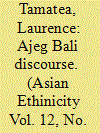

|
|
|
|
|
| Publication |
2011.
|
| Summary/Abstract |
This article explores the Ajeg Bali movement in Bali, Indonesia, as manifest online. It is argued that in addition to Ajeg Bali comprising local politics of decentralisation, it is a manifestation of the globally mobile culture of fear. Analysis of online Ajeg Bali discourse shows the deployment of discourses of fear as a response to intensified hybridising incursions into the Balinese nation-space, resulting from the increased mobility of ideas, images, capital, people and technology.
|
|
|
|
|
|
|
|
|
|
|
|
|
|
|
|
| 2 |
ID:
188731
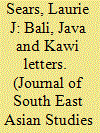

|
|
|
|
|
| Summary/Abstract |
I am not a specialist on Bali. I did live in Bali for more than a year in total over the past several decades, thus witnessing first hand its changing lifeways. I am a cultural and intellectual historian of Bali's neighbouring island of Java, and I carried out research on the central Javanese, specifically Solonese, shadow theatre in the early part of my career. I spent around five years in the city of Solo between 1972 and 1984, half of that time attending performances, and the other half hanging out with puppet masters, shadow theatre aficionados, and students of shadow theatre, and organising a project on collecting branch stories, stories that deviate from the trunk stories of the Solonese shadow theatre repertoire. The repertoire I was researching was the Javanese Mahabharata and Ramayana stories, a repertoire with which I was quite familiar. I was asked to be part of this special review to offer comparative insights between southern Balinese and central Javanese cultures from the point of view of the performing arts. From this perspective, I felt exhilarated to read Richard Fox's More than words and to read how literally alive Balinese letters, writ large and small, are in present-day Bali.
|
|
|
|
|
|
|
|
|
|
|
|
|
|
|
|
| 3 |
ID:
128418
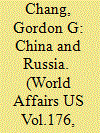

|
|
|
|
|
| Publication |
2014.
|
| Summary/Abstract |
Economic weakness has driven Vladimir Putin's Russia into a "strategic entente" with the Chinese, who in turn get a powerful global ally. The alliance could prove formidable for the West.
|
|
|
|
|
|
|
|
|
|
|
|
|
|
|
|
| 4 |
ID:
119952
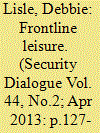

|
|
|
|
|
| Publication |
2013.
|
| Summary/Abstract |
This article argues that the terrorist bombings of hotels, pubs and nightclubs in Bali in October 2002, and in Mombasa one month later, were inaugural moments in the post-9/11 securitization of the tourism industry. Although practices of tourism and terrorism seem antithetical - one devoted to travel and leisure, the other to political violence - this article argues that their entanglement is revealed most clearly in the counter-terrorism responses that brought the everyday lives of tourists and tourism workers, as well as the material infrastructure of the tourism industry, within the orbit of a global security apparatus waging a 'war on terror'. Drawing on critical work in international relations and geography, this article understands the securitization of tourism as part of a much wider logic in which the liberal order enacts pernicious modes of governance by producing a terrorist threat that is exceptional. It explores how this logic is reproduced through a cosmopolitan community symbolized by global travellers, and examines the measures taken by the tourism industry to secure this community (e.g. the physical transformations of hotel infrastructure and the provision of counter-terrorism training).
|
|
|
|
|
|
|
|
|
|
|
|
|
|
|
|
| 5 |
ID:
134281
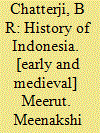

|
|
|
|
|
| Publication |
Meerut, Meenakshi Prakashan, 1967.
|
| Description |
vi, 205p.Hbk
|
| Contents |
B
|
|
|
|
|
|
|
|
|
|
|
|
Copies: C:1/I:0,R:1,Q:0
Circulation
| Accession# | Call# | Current Location | Status | Policy | Location |
| 057916 | 959.8/CHA 057916 | Main | On Shelf | Reference books | |
|
|
|
|
| 6 |
ID:
135063
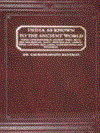

|
|
|
|
|
| Publication |
New Delhi, Asian Educational Service, 2006.
|
| Description |
73p.Hbk
|
| Contents |
Old Publication
|
| Standard Number |
8120605616
|
|
|
|
|
|
|
|
|
|
|
|
Copies: C:1/I:0,R:0,Q:0
Circulation
| Accession# | Call# | Current Location | Status | Policy | Location |
| 057974 | 934/BAN 057974 | Main | On Shelf | General | |
|
|
|
|
| 7 |
ID:
084040
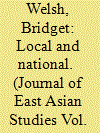

|
|
|
|
|
| Publication |
2008.
|
| Summary/Abstract |
From horrific accounts of men decapitated to "ordinary" accounts of stolen motorcycles, the routine beating and killing of alleged criminals by mobs (massa) has become common in Indonesia. This article examines the patterns of keroyokan-mobbing-from 1995 through 2004 in four provinces and highlights the temporal, spatial, and substantive variations of this phenomenon. Drawing from a database of provincial and local news clippings in Bali, Bengkulu, West Java, and South Kalimantan and in-depth case studies and interviews, this article shows that mobbing varies considerably. Its causes are national and local. The temporal data show that nationally the most important factor to influence levels of mobbing was the introduction of decentralization. The power vacuum that resulted from the policy decision to transfer authority from the center to localities increased local violence. Yet this macrolevel explanation is inadequate to show the spatial variation and different forms of mobbing violence. To understand the causes of these dimensions of variation, one has to move away from macronational approaches measuring violence and include a more microethnographic local approach. A richer understanding of mobbing must be locally rooted. This article uses three case studies to illustrate the centrality of local factors affecting this form of violence. The case studies suggest that mobbing is shaped by the acquiescence of actors in local communities and local learning. The article draws attention to the need to incorporate local data and methods into an analysis of violence in Indonesia and to appreciate varied daily rituals of violence as reservoirs of conflict.
|
|
|
|
|
|
|
|
|
|
|
|
|
|
|
|
| 8 |
ID:
132178
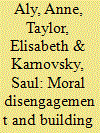

|
|
|
|
|
| Publication |
2014.
|
| Summary/Abstract |
This article reports on the development of an education intervention, the Beyond Bali Education Resource funded by the Australian Governments' Building Community Resilience Grants of the Federal Attorney General's Department, that applies a conceptual framework grounded in moral disengagement theory. Beyond Bali is a five module program for schools that is specifically designed to build social cognitive resilience to violent extremism by engaging self-sanctions and preparing students to challenge the influence of violent extremism that can lead to moral disengagement. The theory of moral disengagement has been applied to the study of radicalization to violent extremism to explain how individuals can cognitively reconstruct the moral value of violence and carry out inhumane acts. The mechanisms of moral disengagement through which individuals justify violence, dehumanize victims, disregard the harmful consequences of violence and absolve themselves of blame have been used in the construction of violent extremist narratives. However, they have not been applied to the development of intervention strategies that aim to counter the radicalizing influences of violent extremist narratives.
|
|
|
|
|
|
|
|
|
|
|
|
|
|
|
|
| 9 |
ID:
171958
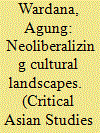

|
|
|
|
|
| Summary/Abstract |
In Bali, rapid conversion of agricultural land has been framed by opinion leaders and mass media as an indication of an agrarian crisis. The government responded by nominating subak (a traditional water management system) landscapes for world heritage status, which was achieved in 2012. Instead of mitigating land conversion, world heritage status has incentivized local farmers to sell their agricultural land. This article examines market-based conservation strategies by investigating their conceptual foundation. It argues that a romantic characterization of subak, combined with neoliberal assumptions which conceive of the land crisis in Bali through a rational choice lens, has led to a counter-productive market-based solution managed in a technocratic manner, ignoring the structural conditions which have been the main cause of land conversion. Thus, the neoliberal response to Bali’s agrarian crisis, rather than conserving subak landscapes and empowering local farmers, has contributed to the further marginalization of local farmers and their landscapes.
|
|
|
|
|
|
|
|
|
|
|
|
|
|
|
|
| 10 |
ID:
103855
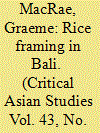

|
|
|
|
|
| Publication |
2011.
|
| Summary/Abstract |
All is not well with agriculture in Southeast Asia. The productivity gains of the Green Revolution have slowed and even reversed and environmental problems and shortages of water and land are evident. At the same time changing world markets are shifting the dynamics of national agricultural economies. But from the point of view of farmers themselves, it is their season-to-season economic survival that is at stake. Bali is in some ways typical of other agricultural areas in the region, but it is also a special case because of its distinctive economic and cultural environment dominated by tourism. In this environment, farmers are doubly marginalized. At the same time the island offers them unique market opportunities for premium and organic produce. This article examines the ways in which these opportunities have been approached and describes their varying degrees of success. It focuses especially on one project that has been successful in reducing production costs by conversion to organic production, but less so in marketing its produce. It argues finally for the need for integrated studies of the entire rice production/marketing complex, especially from the bottom-up point of view of farmers.
|
|
|
|
|
|
|
|
|
|
|
|
|
|
|
|
| 11 |
ID:
095985
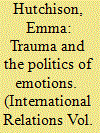

|
|
|
|
|
| Publication |
2010.
|
| Summary/Abstract |
This essay examines how traumatic events can influence the constitution of community in international relations. Trauma is often perceived as isolating individuals and fragmenting communities. This essay argues, in contrast, that practices of representation can make traumatic events meaningful in ways that give them a collective and often international dimension. Central to this process is the role played by emotions. Often neglected in scholarly analysis of international relations, emotions play a crucial political role during times of crisis and can become pivotal sites for the renewal of political stability and social control. The essay illustrates the ensuing dynamics by examining media portrayals of the Bali bombing of 12 October 2002. Focusing on photographs and the stories that accompany them, the essay shows how representations of trauma can provide a sense of collective feeling that is capable of underpinning political community. It concludes by suggesting that international relations scholars can learn much about the politics of community and security by examining prominent representations of trauma and the emotional discourses they mobilise.
|
|
|
|
|
|
|
|
|
|
|
|
|
|
|
|
| 12 |
ID:
135056
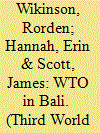

|
|
|
|
|
| Summary/Abstract |
The conclusion of the World Trade Organization’s (wto) ninth ministerial meeting – held in Bali 3–7 December 2013 – is at one and the same time momentous, marginal and business-as-usual. It is momentous because it marks the first multilateral agreement reached in the wto since the organisation began operations on 1 January 1995; it is marginal because the deal reached will have only a limited impact on the global trading system; and it is business as usual because the Bali package will be of disproportionally greater value to the industrial states than to their developing and least developed counterparts. We examine what happened in Bali, covering the principal issues at stake and the content of the outcome, what this means for the wto and for the Doha Development Agenda (dda), and why it all matters. We argue that, while the Bali ministerial is significant and the agreements reached important, the conclusion of the meeting and the package agreed represent only a limited movement forward in addressing the fundamental problems and inequities of the wto system.
|
|
|
|
|
|
|
|
|
|
|
|
|
|
|
|
|
|
|
|
|